- Joined
- Jan 13, 2015
- Messages
- 7,639
- Reaction score
- 669
- Location
- Bedfordshire, England
- Hive Type
- Langstroth
- Number of Hives
- Quite a few
Following the comments on another thread, what are the general thoughts on how you would run a small beekeeping business?
I run mine as a Sole Trader because I didn't want to jump through all the hoops of a running Limited Company but what do others do?
The most appropriate form of business for most small-scale beekeepers is undoubtedly as a "sole trader"
No, they have better than that - they have computer programmes that they input your sales, costs and expenses etc. and it works on algoryhthms that generate what it considers as anomalies ... they look for these 'anomalies' and investigate those. Based on all the accounts they see every year from businesses in that sector.
I have a friend who owned a fish and chip shop ... mostly cash business ... he generated a reasonable profit and paid his taxes ... but he skimmed a nice bit of income off the top. The Revenue investigated ... they knew ... they went back years ... 10,'s of thousands in back tax and interest, 10's thousands in penalties, a further huge cost as they insisted on a nominated independent accountant to carry out an audit which he had to pay for ...
Never ever underestimate the Inland Revenue, they have turned over enough stones in the past to know which ones to turn over and what they expect to find under them.
Every accountant knows that cash-based businesses are more likely to risk. Auditors will do substantive testing on the system but still look at variance between accounts and previous reporting periods. I remember my "Audit" lecturer saying that 5% variance warranted further investigation. Even if you get a "true and fair" statement from your accountant, HMRC may pick a business at random to investigate.

















































